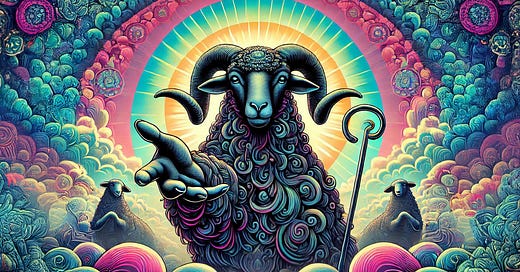This is Part 1 of an ongoing series about what it means to be a black sheep and how it can become your biggest strength. Find Part 2 here.
Some people can only fulfill their life’s potential by challenging the status quo—by taking the black sheep path. There are examples of people taking this path throughout history, from entrepreneurs to artists. It was taking the black sheep path that helped me build my career as a self-employed artist and writer, overcoming my fear of isolation and virtual mobs to create a life that was right for me.
The black sheep symbolizes the person who goes their own way. This symbol exists because, throughout history, people have been shamed and punished for pursuing important discoveries that upset the status quo. The doctor who helped discover germ theory—Ignaz Semmelweis—was intensely mocked and outcast from medicine until his death because he introduced a different theory, but it eventually saved countless lives.
While to many people, this example just seems like a case of someone “ahead of their time,” the black sheep symbol better explains this pattern. People driven by something more than just status or ease, such as truth or growth, are more likely to make challenging discoveries. But the majority of people are driven by status or ease; they don’t understand why others would disrupt the systems they rely on for these pursuits. Thus, they respond harshly.
But the black sheep path is useful to both black sheep and those who will benefit from what they offer. It enables safer experimentation with radically new ideas by freeing black sheep to be society’s guinea pigs. Individuals experimenting with alternatives to the status quo is how revolutionary knowledge reaches society.
The more people understand the black sheep path, the more we can advance toward humanity’s flourishing.
Artists, entrepreneurs, and non-conformists especially thrive in cultures that make room for black sheep. This is partly why Europe and America were once considered world-class cultures for art and business. Such individualist cultures affirm that every individual has inherent worth and should have the right to direct their own life, whether or not they follow the herd. When a culture doesn’t crack down on non-conformity, black sheep can follow their instincts to find the undiscovered, like new styles of art or technological innovations. Business owners and scholars also benefit from a culture that respects black sheep, as they’re in positions to facilitate a black sheep’s innovations.
Even people who seem like they wouldn’t benefit from the existence of the black sheep—like people-pleasers and conformists—still do. Such people lack a sense of self-worth, letting others push them around instead. Witnessing black sheep pursue unique paths and succeed can inspire them to adopt more courage, self-worth, and autonomy.
Being a black sheep isn’t just something that you do; for many, it’s an intrinsic predisposition. While some people find themselves surrounded by an irrational herd and are pushed into the back sheep role, others are born with traits that lead them down this path: a disagreeable nature, less sensitivity to social norms and pressure, and being driven more by truth than acceptance. Both types of black sheep are important counterweights to overbearing groups, but situational black sheep don’t always remain black sheep. Without an understanding of the black sheep pattern, they can just as easily go on to demonize non-conformity in other instances, missing the wisdom to be gained from their black sheep experience.
Born black sheep often roam through life unaware of their potential, confused by anti-individualist messaging. For many people, including myself, being a black sheep causes inner conflict. Those who fail to follow their calling may become overly zealous herd members as a way to quiet their self-doubt, becoming collectivist activists or religious fanatics.
Perhaps more sadly, many people simply let life pass them by, always feeling like there was something else they should have done, but never feeling free enough to find it.
The individual, their community, and all of society suffer when a potential black sheep is punished for following the path they were meant for. Imagine how many more people may have died of preventable infections if Semmelweis wasn’t brave enough to follow his path despite the brutal consequences he faced. That’s the beauty and power of a culture that respects its black sheep: everybody benefits when individuals are free and empowered to pursue what they’re meant for.






